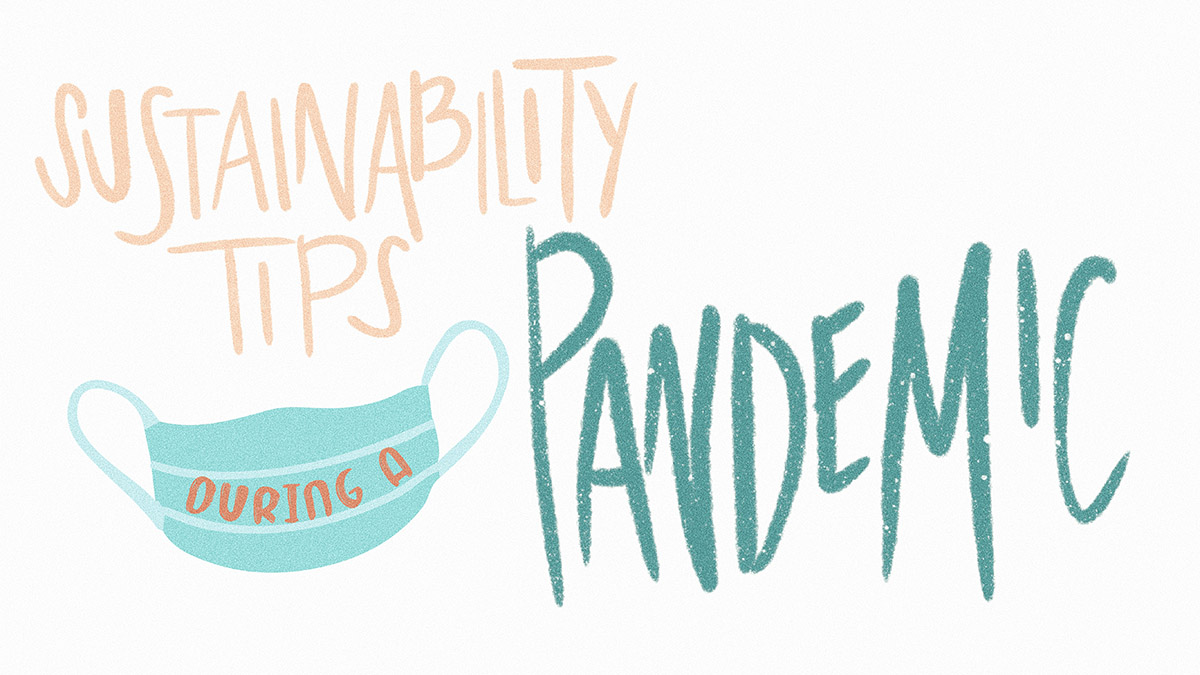Reducing waste pandemic-style
Sherry Liang
Friday, September 11, 2020
It’s a difficult time to be thinking of reducing waste when your only thoughts are about surviving this pandemic. But from disposable masks to cleaning supplies to single-use plastics, precautionary measures during the pandemic are introducing more waste in our lives than ever before.
Reducing waste doesn’t have to be about trying to change every aspect of your life so you can fit a years’ worth of waste into a Mason jar. It also doesn’t mean beating yourself up over single-use disinfectants or disposable masks when sustainable alternatives are unavailable. Reducing waste sustainably and effectively is simply about incorporating practices into your normal routine where and when you can.
From cooking to composting, reducing to recycling, here are some tips about ways to reduce your waste during a pandemic.
Let’s talk masks
The most significant source of waste that’s been introduced in our lives over the last few months are masks. From medical-grade N-95 masks to embroidered designer masks — we’ve seen them all over the last few months.
Of course, the most sustainable way is to use reusable masks — most are around $10 (bonus points if you’re buying local with sustainable materials!). They can be cotton, lined with filters or made from other materials. This NPR article provides a great rundown of the different materials that offer the most protection.
Forgot to wash your reusable masks? Only have a disposable mask on hand? It’s OK — life happens! However, be sure to cut the straps before you dispose to ensure the straps don’t potentially cause harm to wildlife in case your mask escapes the trash.
When it comes to food…
Food can be the ultimate source of comfort in times of distress. From takeout to snacks, dining hall to home-cooked, there are ways to adopt a more frugal and sustainable diet on a college budget.
One of our favorite tips from zero-waste intern Avery Lumsden is to improve home-cooking skills. Takeout, more often than not, requires extra single-use containers, along with fossil fuels required for transportation. Treating yourself to a meal out from your favorite local restaurant supports our community, but also whip out that apron and whisk for your day to day meals! Avery said she has been baking bread, which allows her to consume carbs without the packaging. Not sure about your own culinary skills? Here’s some nutrition tips from University Health Center.
Once you’re done baking, prepping your veggies, or even just brewing your tea or coffee, compost the scraps! Living in Athens and around UGA, there are several free composting opportunities. At Athens-Clarke County compost drop off sites — all you need to do is collect your scraps in a paper bag (yes, that includes your Trader Joes’ grocery bag!) or other compostable packaging throughout the week and drop it off at one of the five locations. There are also multiple on-campus composting bins in departmental break rooms and residence hall kitchens.
Another way to consume food more sustainably is through reusable utensils. Even if you are ordering takeout, omit the single-use utensils. Keep a reusable fork and spoon in your dorm room, purse, or pack for when you take-out food from dining halls, other on-campus eateries, or your favorite spot in town. With several meals a day, single-use plastic for food can add up to a sizable amount in a short period of time.
Home is where the trash is
UGA Housing Sustainability Director Christy Tweedy has several sustainable habits for students to adopt during the pandemic. In addition to composting food scraps, Christy said students can also take measures to properly dispose of trash — for example, wipes clog pipes and are better left out of the toilet, while single-use masks and gloves should be disposed in the trash and not littered on the streets. Students can also take on efforts to reduce other forms of waste, such as turning off the light when leaving the room or taking shorter showers to conserve energy and water.
Online shopping has become a staple for those boredom-filled hours stuck indoors. However, Christy said people should consider the implications — both economically and environmentally — of online shopping before adding to cart.
“When shopping online — ask yourself if you really need this item. Then call around to see if you can buy that item locally,” Christy said. “This not only supports our local economy, but reduces fossil fuels for transportation, and cuts down on shipping costs/materials.”
Sometimes shopping online is the most accessible option — for price, timing, or other reasons. In that case, Avery advises people to look into Amazon’s “Frustration-Free Packaging Program.”
And finally...
Take it easy — we’re in a pandemic! Above all other tips, prioritize your and your community’s health. Wear a disposable mask if you have no other option. Use a disinfectant wipe if it’s the only sanitation resource you have. Eat with the plastic fork if you forgot your reusable utensils. (Please do not eat with your hands!) Just be sure to dispose of these products properly and continue to seek sustainable alternatives whenever possible.
“Reducing contact with others is the best way we can get back to normal,” Avery said. “Maintaining the health and safety of the greater Athens community needs to come first right now, but I would say get creative in the way you shop and interact with waste streams.”
